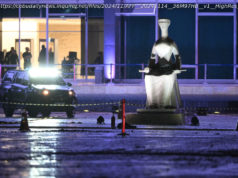The bumbling Hawaii state emergency worker — who officials said hit the “wrong button” when he sent out a Jan. 13 inbound-missile alert that plunged the…
The bumbling Hawaii state emergency worker — who officials said hit the “wrong button” when he sent out a Jan. 13 inbound-missile alert that plunged the state into chaos — actually believed the Aloha State was under attack, it was revealed Tuesday.
The employee who sent out the alert warning “Ballistic missile threat inbound to Hawaii. Seek immediate shelter. This is not a drill” honestly believed the bombs were coming and even clicked OK when he or she was asked, “Are you sure that you want to send this Alert?,” according to a written statement the unidentified worker provided to the Federal Communications Commission.
What followed was 38 minutes of chaos as residents, tourists and celebs sought shelter in hotel basements, state workers scrambled to undo the message, and Gov. David Ige struggled to remember his Twitter password so he could tell everyone the alert was issued in error.
The state emergency management agency “didn’t have reasonable safeguards in place to prevent human error” and “didn’t have a plan for what to do if a false alert was transmitted,” according to FCC chairman Ajit Pai.
“Every state and local government that originates alerts needs to learn from these mistakes,” he said during a Tuesday review.
Ige had previously claimed the employee hit the wrong button during the drill.
An investigation revealed Tuesday that a night-shift manager planned to test incoming dayside workers, but the daytime manager thought the test was meant for the departing night crew.
So the day crew was not ready when the night manager called in posing as a member of the Navy to issue the practice alert.
An off-script message broadcast to workers erroneously said “This is not a drill” before clarifying “Exercise, exercise, exercise,” but the worker who hit the alert button did not hear the part about it being an exercise, officials said.
The worker was reassigned, and Ige said the state is implementing new safeguards to prevent future confusion.






